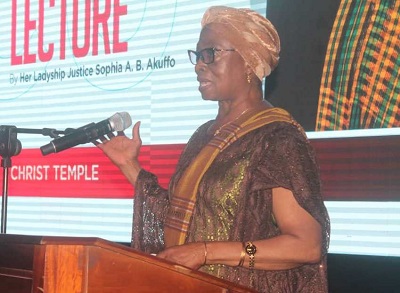
The former Chief Justice, Justice Ms Sophia Akuffo, has stated that fundamental human rights are not given by anybody and is of an inherent dignity, equal and inalienable rights of all human family or groups in the world.
She affirmed that, the disregard and contempt for human rights had resulted in barbaric acts which had outraged the conscience of mankind.
The Former Chief Justice was speaking at a public lecture on the topic “Enforcement of Human Rights in Africa”, organised by the Central University College, in Accra on Wednesday.
The Former Chief Justice said the advent of the world in which human rights shall enjoy freedom of speech, belief and freedom from fear and want, was the highest aspiration of the common people.
Justice Akuffo, said democracy was nothing unless fundamental human rights were backed by good governance.
According to her, the objective of the universal declaration of human rights conferred 29 rights on everyone, and these included freedom from slavery, freedom from torture or degrading treatment, freedom from arbitrary arrest, right to nationality and right to own property.
She noted that the respect of the African continent to the collective realization of human rights came into being on the 21st October 1986, when the African Charter on Human and Peoples Right (ACHPR) was adapted and ratified by every member state of the African Union and covers civil, political, economic, social and cultural rights.
This, she said, was a document in recognition of collective right (peoples right) and the right to development.
She said the charter also established the African Commission on Human and Peoples’ Rights for the promotion and protection of human and peoples’ rights in Africa.
She mentioned that the ACHPR adopted a protocol for the establishment of African Court on Human and Peoples Right which came into force in 2004, and added that the court was to complement the work of the commission, interpret the charter and the enabling protocol, and was also charged with the interpretation of treaties that were ratified by member states.
She said the member states adopted the protocol to the African charter on human and peoples rights, on the rights of women in Africa and that came into force in 2005 and is commonly referred to as the Maputo protocol.
That which she said, was signed by 49 countries but ratified by 42, of which some of the countries that signed had placed reservations on some of its provisions.
She said beyond the regional and sub-regional legal instruments, African states had their own declarations of human rights within their National Constitutions.
FROM DANIEL AMOO






